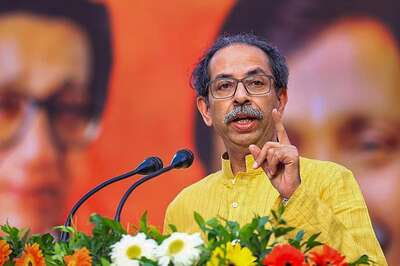
views
In our fast-paced and uncertain world, the importance of health insurance cannot be emphasized enough. It stands as a vital pillar of financial security, providing individuals and families with a crucial safety net against the unpredictable costs of healthcare. Beyond mere monetary protection, health insurance grants access to essential medical services when they are most needed, ensuring that health concerns do not spiral into financial crises.
The significance of health insurance becomes particularly evident during unforeseen illnesses or accidents, shielding individuals from the potentially devastating expenses that can arise from medical treatments. Moreover, it encourages a proactive approach to health by facilitating regular check-ups and preventive care, ultimately promoting overall well-being.
In the midst of these uncertain times, where global health challenges abound, the value of health insurance shines even brighter. It offers a sense of stability and peace of mind, allowing individuals to navigate life’s twists and turns with confidence, knowing that their health and financial interests are safeguarded.
“Health insurance industry in India has undergone a sea-change over the last 3-4 years. Covid 19 had given a big push to health insurance, making people realise the uncertainties of life, and their under-preparedness, in case of mass or even individual health crisis. Despite this, data reveals that approximately 70% of the population is estimated to be covered under either public health insurance schemes or voluntarily opted private health insurance. This leaves a significant portion of the population, comprising over 40 crore individuals, without any form of health insurance coverage,” notes Indraneel Chatterjee, Co-founder, RenewBuy. Moreover, it encourages a proactive approach to health by facilitating regular check-ups and preventive care, ultimately promoting overall well-being.
In the midst of these uncertain times, where global health challenges abound, the value of health insurance shines even brighter. “It offers a sense of stability and peace of mind, allowing individuals to navigate life’s twists and turns with confidence, knowing that their health and financial interests are safeguarded,” emphasizes Layak Singh, Co-founder of Artivatic AI.
Despite the evident benefits, there remains a significant gap in health insurance coverage. “Approximately 70% of the population is estimated to be covered under either public health insurance schemes or voluntarily opted private health insurance,” reveals Chatterjee. This leaves over 40 crore individuals without any form of health insurance coverage.
“It is imperative for the remaining 40 crore individuals to secure health insurance coverage,” emphasizes Chatterjee. With rising healthcare expenses and an increase in lifestyle-related diseases, the need for coverage becomes even more pressing. “Often, residents of smaller cities travel to metropolitan cities in search of better treatment options, which invariably incurs financial strain,” he adds.
The landscape of health insurance is evolving rapidly, driven by technological advancements and regulatory reforms. “Initiatives by the Indian government such as Ayushman Bharat Yojana and Pradhan Mantri Jan Aarogya Yojana (PM-JAY) are playing pivotal roles in expanding health insurance coverage,” remarks Singh. These programs are particularly instrumental in enhancing health insurance penetration in Tier 2, 3 cities, and beyond.
Advancements in technology are also reshaping the health insurance industry. “Insurers are embracing cutting-edge technologies, positioning themselves for a future that prioritizes efficiency and sustainability,” explains Pankaj Vashistha, CEO & Co-founder of Policy Ensure. From automated claims processing to personalized products, InsurTech solutions are driving a systemic overhaul.
“Through the health insurance policy, the insurance holder receives quality medical care without putting a strain on their finances,” asserts Vashistha. By assessing key health insurance benefits and comparing different plans, individuals can make informed decisions tailored to their specific needs.
Technological advancements in Insurance
Over the last few years, the healthcare industry has experienced significant transformations, largely fuelled by advancements in technology. “With approximately 800 million people equipped with smartphones and internet access, the availability of healthcare information and services is becoming seamless. While these changes are predominantly observed in major metropolitan areas, extending their reach to smaller cities and towns will require additional time and effort,” opines Singh.
The change is also being observed in health insurance where technological advancements and regulatory shifts are driving change in consumer behaviour. Present-day consumers exhibit a heightened awareness regarding the significance of health insurance and the necessity of safeguarding themselves financially. Moreover, there is a noticeable increase in financial literacy concerning the availability of health insurance tailored to individual needs.
Insurers are embracing cutting-edge technologies, positioning themselves for a future that prioritizes efficiency and sustainability. “Using tech like Optical Character Recognition (OCR), Artificial Intelligence (AI) / Machine Learning (ML), GenAI (General Artificial Intelligence) Robotic Process Automation (RPA), insurers are witnessing faster claim settlements. Using micro-data analytics, insurers are crafting tailor-made healthcare coverage, aligning with individuals’ financial capabilities and needs, especially for those residing in Tier 2, 3 cities, and beyond. The health insurance market is tapping into the telemedicine and home healthcare to prevent expensive hospital stays and emergency visits. These will be transformational in the healthcare industry in the years to come,” shares Singh.
From automated claims processing to personalized products, InsurTech solutions are driving a systemic overhaul. The overarching aim of these transformative changes is to democratize health insurance, improve service standards and enhance well-being of the consumers; and ultimately reduce overall costs.
In conclusion, amidst the uncertainties of today’s world, health insurance emerges as a crucial safeguard against financial instability in the face of healthcare expenses. With concerted efforts from both public and private sectors, coupled with advancements in technology, the aim is to democratize health insurance and improve the overall well-being of individuals and families across the nation.




















Comments
0 comment